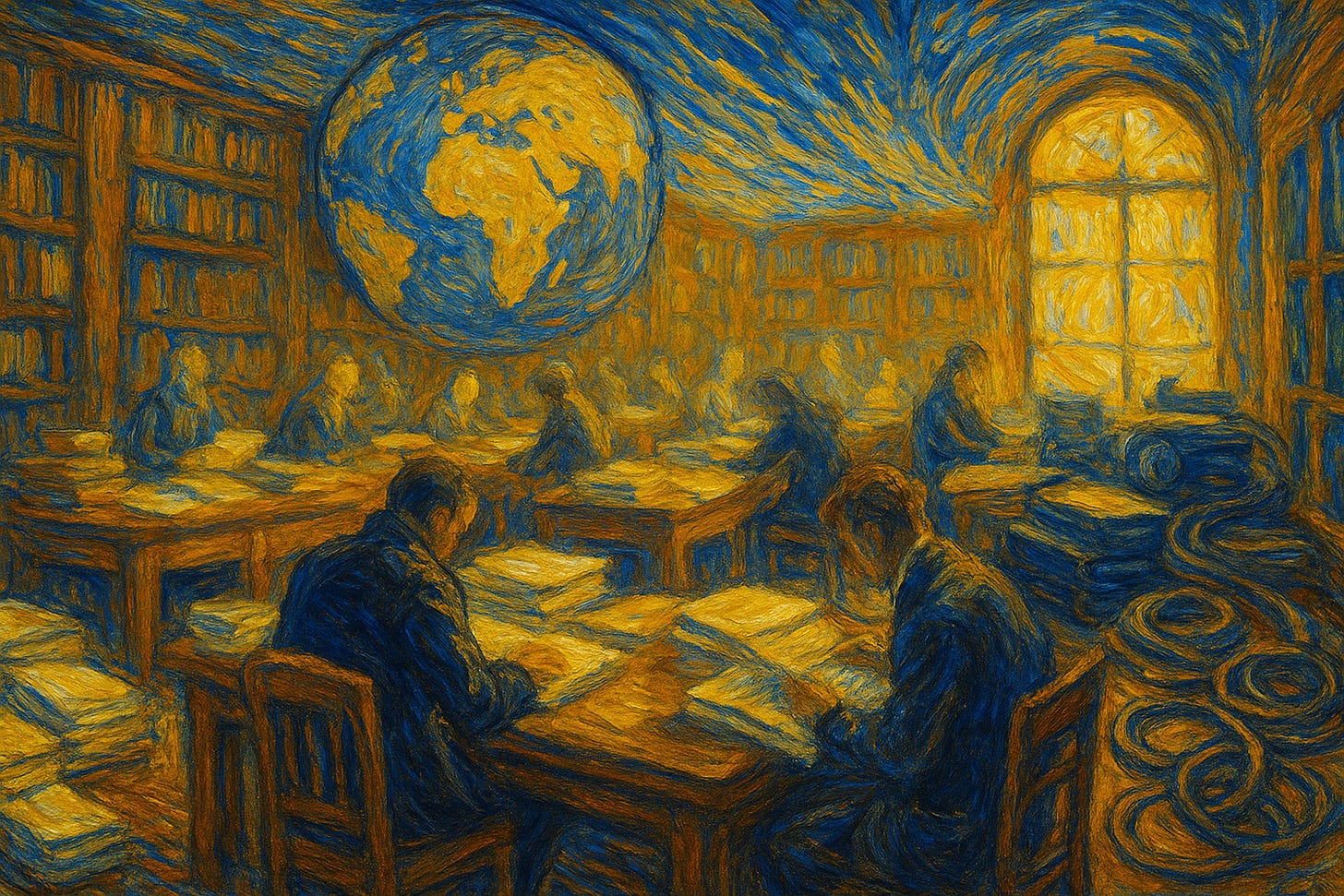🖋️ When the Fields Fought Back Part III — The Paper Earth
How words, ledgers, and machines remade the world
1450 → 1900 CE
🕯️ The Whisper Becomes a Shout
For a thousand years, parchment belonged to monks and kings—slow, sacred, and scarce. Then Gutenberg’s press broke the silence. A blacksmith’s trick of movable type became a social earthquake. Ink turned into weaponry.
The first printed books weren’t always a gentle read: indulgences, polemics, heresies, prophecies. Every word that had been whispered for centuries could now shout.
A monk with a hammer and a few sheets of paper could bring down a cathedral.
Europe learned that ideas, once copied, could not be recalled.
⛪ Scripture Goes Public
Gutenberg’s Bible was meant to unify belief; instead, it divided it.
Once the Word was printed, it stopped belonging to priests. Every reader became a potential heretic. Luther’s tracts spread faster than armies, and faith fractured along lines of translation.
In England, the Bible in English became as subversive as any rebellion.
It created a literate laity, a people who could read the law and question the king.
The same presses that printed the King James Bible would soon print pamphlets calling for the king’s death.
🎭 The Stage and the Street
The same presses that printed manifestos printed plays.
Shakespeare filled the theatres with people who thought like citizens, not subjects.
His stage was a rehearsal for politics—
a place where butchers and princes could share the same lines.
When commoners quoted kings, the social order started to crack.
The English Bible gave the new language gravity; Shakespeare gave it wings and took it onto a new level.
Together they made English portable—a tongue that could cross oceans, shipwrecks, and centuries. It was the first truly mass medium: spoken in taverns, printed in colonies, memorised in schools. From Canterbury to Calcutta, the same words began to echo.
This wasn’t the birth of a nation; it was the invention of a vocabulary for the modern world. English became the template for administration, commerce, and correspondence—a language designed to travel, to replicate (and evolve), to file reports. It was already preparing the world for empire, an empire made not just of conquest but of comprehension.
By the time of the Enlightenment, Europe’s argument had gone global.
Print didn’t just spread ideas, it standardised them. Revolutions now spoke in a common tongue, and the future had quietly chosen its language.
🌍 The Empire of Paper
By the 1800s, Britain ruled a quarter of the planet not by force alone, but by forms, ledgers, and stamps. The empire was a bureaucracy printed into existence.
India was administered by memoranda; Australia settled by survey maps;
Africa divided by correspondence. Orders left Whitehall on foolscap and returned months later with signatures of compliance. The British Empire was the first machine to run on carbon copies of itself.
The sun never set on the clerks.
Every colony a filing cabinet, every rebellion a report.
The imperial archive became the planet’s nervous system:
maps, censuses, gazetteers, dictionaries, shipping logs, rail timetables.
Even God had become an administrator.
It was the age of Around the World in Eighty Days—
Jules Verne’s fantasy of global motion running perfectly on paper time.
Phileas Fogg circled the planet by timetable, a pilgrim of bureaucracy proving that empire was not adventure but logistics. It was possible to traverse the world without ever leaving the schedule.
But that same paper that bound the empire together also hid what it was built on.
Ledgers turned plunder into profit, statistics into absolution.
The violence was not chaos but accounted for—each shipment logged, each body tallied, each famine reduced to a line in a report.
The East India Company ran private armies with invoices. African slaves, rubber, cotton, and sugar moved through ports like blood through veins.
Colonies starved while London’s markets stayed orderly. Empire made atrocity look administrative.
It taught Europe how to kill by correspondence, how to turn cruelty into process,
and process into progress.
The same habits that ruled Bengal and the Congo would soon return home:
ration books, rail schedules, requisition orders, lists of the dead. The industrialisation of paperwork became the paperwork of industrialised death.
The empire had mastered control so perfectly that the next century would use its methods to destroy itself.
🧭 The Fuse
By the end of the nineteenth century, the planet had been formatted.
Every empire ran on paper; every frontier had a timetable. News crossed oceans faster than ships; rumours outran truth.
Factories, presses, and telegraphs all beat to the same pulse. Information had become infrastructure, and ideology travelled at the speed of print.
Europe congratulated itself on its civilisation, its libraries, its newspapers, its railways
and never noticed the kindling it was laying down.
The next century would strike the match.
Next up 👉 Part IV — Total War, Total Media:
The world that could print anything finally printed its own destruction.
Every empire’s network, of paper, telegraph, train, became a delivery system for death.




Looks like the library from A Discovery of Witches.
Shared to Bluesky and LinkedIn🌻